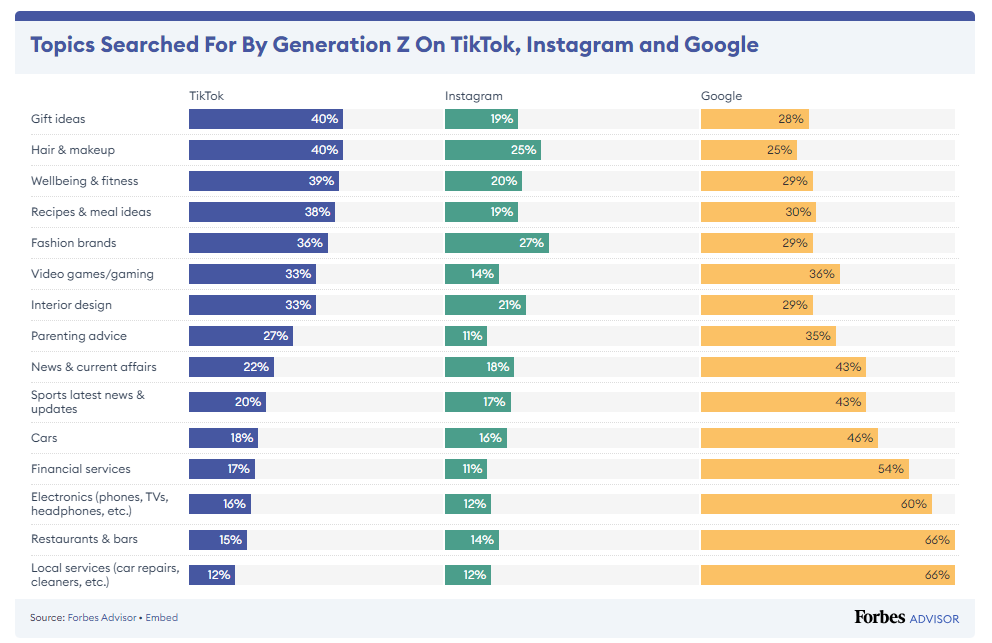Recent research reveals a striking change in internet search behaviour across generations. A study by Talker Research from the US, featured in Forbes, highlights a notable trend: Generation Z is increasingly turning away from traditional search engines like Google, instead favouring social media platforms for their search needs.
This shift could have profound implications for brands and marketers aiming to capture the attention of younger audiences. Here are the essential business takeaways that brands should consider in this new digital age.
Key Takeaways from the Research
- Decline in Google Usage Among Gen Z: There is a 25% decrease in Google usage for searches between Generation Z and Generation X. This trend suggests that younger users are seeking more immediate, visually engaging, and socially connected ways to find information.
- Social Media as Primary Search Tool: A quarter of people (24%) reported using social media primarily for online searches. This figure rises significantly among younger users, with 46% of Gen Z and 35% of Millennials relying more on social media than traditional search engines.
- Mobile-First Internet Access: A third of people (33%) now access the internet exclusively through their mobile phones. This highlights the growing importance of mobile optimisation in digital strategies.
- Brand Discovery on Social Media: 24% of respondents discover new brands on social media daily, underscoring the platform’s role in shaping consumer habits and preferences.
- YouTube as a Search Engine: 57% of people use YouTube for searches in the same way they would use Google, indicating a shift towards video content for information retrieval.
The Shift to Social Media for Searches
Social Media as a Search Engine
The traditional role of social media as a platform for connectivity and interaction has evolved. It is now a primary search tool for a significant portion of the population. This trend is particularly strong among younger generations, who prefer the dynamic and visually rich content offered by platforms like TikTok and Instagram.
For example, TikTok has become a preferred platform for finding businesses and specific content like “hair and makeup” tips, which 17% of users search for on the app.
Mobile Devices as the Gateway
The migration from desktops to mobile devices is evident, with a third of respondents using their smartphones as their sole means of internet access.
The trend is even more pronounced among Millennials and Gen Z, with 40% of the latter group relying primarily on mobile devices. This shift necessitates that businesses ensure their websites and digital content are optimised for mobile to capture and engage this audience effectively.
The Impact on Brand Discovery
Social Media’s Influence
Social media platforms are becoming central to brand discovery. The study revealed that 24% of people find new brands daily through social media, and this figure rises to 44% among Gen Z. This shift indicates that brands need to maintain a strong and active presence on social media platforms to reach and influence potential customers.
The Role of Video Content
YouTube’s rise as a search tool highlights the increasing importance of video content. More than half of the respondents use YouTube for searches, paralleling its use with Google. This trend suggests that brands should invest in creating high-quality, informative, and engaging video content to attract and retain viewers.
Adapting to Changing Search Behaviours
The decline in Google usage among younger generations and the rise of social media as a primary search tool signal a need for brands to adapt their digital strategies.
Traditional SEO practices are still important, but businesses must also consider the SEO implications within social media platforms. This includes optimising content for social media searches, using relevant keywords, and engaging with users to boost visibility and discoverability.
Understanding What People Search For
While it’s no surprise that younger audiences are more likely to use social platforms for product discovery, understanding the specific types of searches they conduct can provide valuable insights for marketers.
According to Forbes Advisor’s study, Gen Z users primarily turn to social apps for fashion, beauty, food, and craft-related trends—topics that are closely tied to self-care, well-being, and DIY projects. Conversely, they still rely on Google for more significant purchases, places to go, and professional services.
This distinction is crucial for tailoring marketing efforts. For brands targeting younger audiences, focusing on visually appealing, trend-driven content on platforms like TikTok and Instagram can be highly effective.
Meanwhile, to reach older audiences or promote more substantial products and services, maintaining a robust presence on Google remains essential.
The Role of Generative AI in Search Trends
The introduction of generative AI tools within Google Search is an interesting development in this evolving landscape.
These AI-driven responses provide automated overviews for certain queries, which could potentially draw users back to Google by offering more conversational and interactive search experiences. Similarly, TikTok and Meta are experimenting with their own AI chatbots, aiming to enhance user interaction and information retrieval on their platforms.
The impact of these AI tools on search behaviour is yet to be fully realised, but they represent a potential convergence of traditional and social search methods. Businesses should monitor these developments and consider how AI can be integrated into their digital strategies to stay ahead of the curve.




RECOMMENDED FOR YOU
Meta Adds New AI Tools To Supercharge Lead Gen
Meta is rolling out a wave of updates to…
Meta is rolling out a wave of updates to…
Meta Announces Business AIs For Brand Websites
Meta is moving further into the AI assistant space…
Meta is moving further into the AI assistant space…
Meta Uses AI Chats To Refine Ad Targeting
Meta has announced a major update to how it…
Meta has announced a major update to how it…